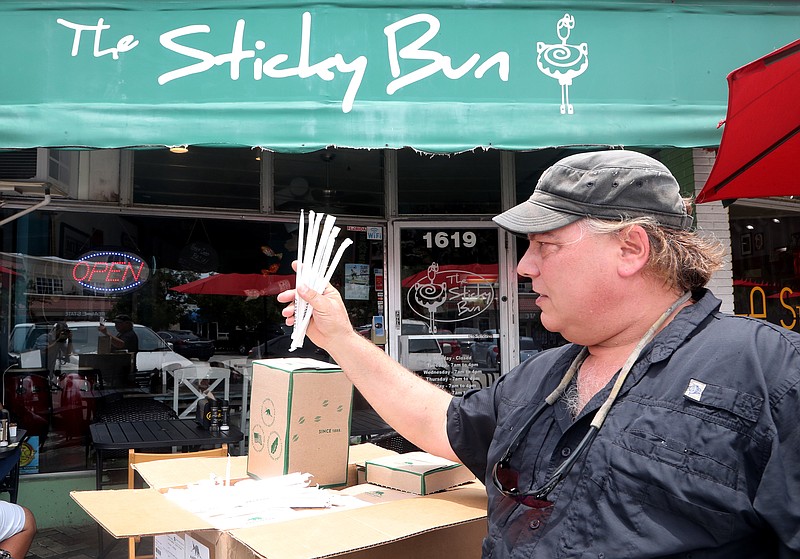"I just want to say one word to you. Just one word. Are you listening? Plastics."
- Mr. McGuire to Benjamin Braddock in "The Graduate"
Young Benjamin Braddock, portrayed by Dustin Hoffman in the acclaimed 1967 movie "The Graduate," is a recent college graduate but doesn't yet know what to do with his life.
At a party given in his honor by his parents, a contemporary of his mother and father tells him to get into the then-burgeoning field of plastics.
Today, many people with environmental concerns would just as soon some plastics went the way of the dinosaur.
To help make that happen, some cities have banned or limited the use of plastic straws in restaurants. Other localities have banned single-use plastic items, including shopping bags and cups.
Now, plastic straws are a tiny percentage of plastic that is produced, and on the surface it seems ludicrous that banning or limiting straws is the key to a pristine environmental future.
Plastics do not degrade naturally, though, and after one use many end up in landfills, storm drains or the ocean. Only last week, a dead pregnant sperm whale that washed up on the coast of Sardinia, Italy, contained 49 pounds of plastic in its stomach. And seeing smaller marine animals caught up in the plastic rings that formerly contained cans or bottles is heartbreaking.
Fortunately, many kinds of plastics are recyclable and can be picked up by the city of Chattanooga or can be taken to recycling centers in unincorporated Hamilton County.
Indeed, when avid recyclers consider how often they find themselves able to recycle a fast-food plastic cup and its lid, but are forced to throw away the straw, the enormity of the problem comes into focus.
Unfortunately, too many people don't take the time to recycle at all. A photograph accompanying a Feb. 13 Times Free Press article on the trash in Chattanooga Creek shows numerous plastic items that could have been recycled instead of being dumped in the water. In addition to plastic, the likes of aluminum cans, Styrofoam and carpet - all of which have the potential to be recycled - are visible in the photograph.
A bill that recently passed both houses of the Tennessee General Assembly and is on its way to Gov. Bill Lee would ban municipalities from implementing bans on single-use plastics, as global cities such as Montreal, Seattle, New Delhi, and Malibu, California, have done.
Although the governor is expected to sign the bill, state Sen. Richard Briggs, R-Knoxville, would like to come back next year and pass legislation that puts in place statewide regulations on single-use plastics.
He doesn't have details on his potential bill but believes a measure needs to be in place to reduce plastic waste.
Briggs calls himself "a retro guy" and said he would prefer to return to the days when cups, straws and grocery sacks all were made from paper.
Given the environmental wreckage of single-use plastic, we'd like that, too, but we remember why the use of plastics grew in the first place. Just over 50 years ago, when the fictional Benjamin Braddock was pondering his future, the issue was - and still is, frankly - the harvesting of trees for all manner of paper goods.
So "plastics" made a lot of sense - until it didn't.
We hope Briggs will have some thoughtful ideas the legislature could consider without forcing Tennessee to descend into nanny-state status in constraining its residents.
That potential future is why the "ban on bans" measure on the way to the governor also prevents local governments from taxing, restricting or regulating food or drink content.
New York City, in 2013, for instance, adopted a regulation to prohibit the sale of many sugared drinks more than 16 ounces in volume. However, that state's Supreme Court ruled in 2014 that the city had exceeded the scale of its regulatory authority in doing so.
The middle ground between governments regulating your plastic use and governments preventing other, smaller governments from regulating your plastic use is personal responsibility. Governments regulating your plastic use don't believe you have any, and governments preventing smaller governments from regulating your plastic use assume you have enough of it when you probably don't.
We've all been given stewardship over the environment. Let's show that we understand that at least by recycling and by carefully monitoring our plastic use.
